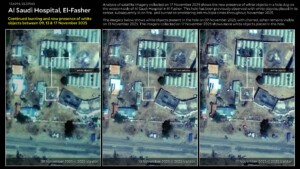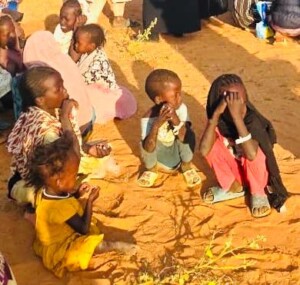Analyst: ‘Sudan govt must confiscate ill-gotten gains’
A prominent political analyst argues that the transitional government must confiscate the unlawfully obtained property in the country. He describes the capitalists that grew during the era of the former regime as parasitic, and greedy.
 Officers display some of the cash hoard found at the residence of deposed president Omar Al Bashir in April (RD correspondent)
Officers display some of the cash hoard found at the residence of deposed president Omar Al Bashir in April (RD correspondent)
A prominent political analyst argues that the transitional government must confiscate the unlawfully obtained property in the country. He describes the capitalists that grew during the era of the former regime as parasites.
On Thursday, during a Tea-Cup Forum of El Tayyar daily newspaper, Dr Haidar Ibrahim, Director of the Sudanese Studies Centre and a prominent sociologist and political analyst, argued that the fight against the Muslim Brotherhood and their exclusion should be on the ground of intellectual, cultural and social aspects.
He called on the transitional government to confiscate the unlawfully obtained property in the country, expressing his concerns about the delay in such a move. "I wish we can apply the principle of how you have obtained such wealth during the next stage", he said.
Ibrahim described the number of capitalists that grew during the era of the former regime as "greedy parasites".
He called for the establishment of "an advisory body that can advise, support and fill the gaps or defects of the transitional government", and for legislation to prevent anyone who has committed a criminal offense or has been tried to participate in the upcoming elections.
The analyst supports the trial of Al Bashir and oter former leaders internally because "it is ethical and exposes their ill practices. After we take our right in Sudan, then he can be handed over to the international criminal court," he stated.
Political compromise
In a political forum on Thursday, political analyst El Shafee Khidir argued that the success of the transitional period highly depends on a political compromise between the leftist and Islamic parties. He claimed that without such a historical compromise that can ensure the preferences of both the left and right, there will not be a transitional period. To resolve an issue such as the relationship between the state and religion, there must be a compromise, he said.
Khidir attributed the repeated conflicts in Sudan to the failure of the elites to answer the question of change and to the absence of a national vision that can transform the country into a well-developed nation.
He argued that there are grounds for historical compromises such as independence of the judiciary, equality of all Sudanese before the law irrespective of their belief, race or sex, etc. He further argued that the issue of national identity can be solved through the equal recognition of cultures, beliefs, languages, and ethnicities.
Radio Dabanga’s editorial independence means that we can continue to provide factual updates about political developments to Sudanese and international actors, educate people about how to avoid outbreaks of infectious diseases, and provide a window to the world for those in all corners of Sudan. Support Radio Dabanga for as little as €2.50, the equivalent of a cup of coffee.












 and then
and then